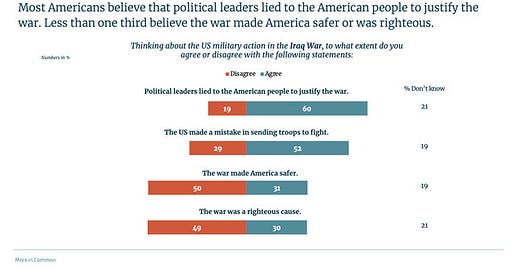Year Zero
Tecumseh Court asks what the twentieth anniversary of the Iraq War teaches us about Ukraine.
By Tecumseh Court
On May 24, 1970, about 70 kilometers from the USSR’s border with Norway, Soviet scientists began drilling a hole with the goal of digging deeper into the planet than mankind ever had before. The year before, the Americans had become the first to walk on the moon. Perhaps the Soviets thought that if they couldn’t beat the enemy to the heavens, they could surely beat them to hell.
We don’t know exactly who ordered them to begin digging, or why. In 1994, the project was abandoned. We do know that the Kola Superdeep Borehole, 12.3 kilometers deep, is the furthest man has ever burrowed into the earth. The hole is deeper than Mount Everest is tall. It is deeper than the Marianas Trench, the ocean’s lowest point. The Americans won the space race, but in the dirt’s depths, the Soviets triumphed.
The voyage took surprising paths. By 1979, they had reached 6.9 kilometers. Drill bits that had sliced through granite rock snapped against formations and layers of unexpected density. They were rebuilt and refitted, again and again. Years later, at 12 kilometers, scientists found temperatures of 356 degrees Fahrenheit rather than the 212 degrees they had expected. At those temperatures, rock liquefied, and the drill bits behaved as if digging through plastic.
From 1989 to 1992, the Soviets, then the Russians, continued searching for material suitable for drilling through the earth, hoping to dig a 15-kilometer hole. They discovered water in the earth’s crust at depths no model had predicted, as well as hundreds if not thousands of protozoa and other life forms. But after the Soviet Union collapsed, digging ceased. In 2005, the borehole was capped. Today, the station is a ghost town.
Iraq, two decades later
Twenty years ago, as the world reeled from the 9/11 terror attacks, a corps of American warriors and a handful of their coalition partners camped in Kuwait. A prospective diplomatic endgame dominated headlines. Then-Secretary of State Colin Powell, himself no stranger to Saddam Hussein, briefed the United Nations on the casus belli. War would come to Iraq, Powell claimed, because the nation’s ruling regime possessed weapons of mass destruction that would threaten humanity if it did not.
Keep reading with a 7-day free trial
Subscribe to The Cosmopolitan Globalist to keep reading this post and get 7 days of free access to the full post archives.



